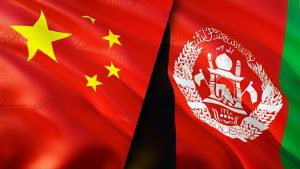The Diplomat author Mercy Kuo regularly engages subject-matter experts, policy practitioners, and strategic thinkers across the globe for their diverse insights into U.S. Asia policy. This conversation with Dr. Sean Roberts – associate professor of the practice of international affairs and director of international development studies at George Washington University and author of “The War on the Uyghurs: China’s Internal Campaign Against a Muslim Minority” – is the 281st in “The Trans-Pacific View Insight Series.”
Explain how relations with Afghanistan serves China’s national interests in the absence of U.S. military forces.
China’s interest in Afghanistan is mostly related to the security of its Belt and Road Initiative (BRI). It would be easy enough for the Chinese government to circumvent Afghanistan while building the infrastructure for the commerce routes it envisions as part of the BRI, but the country is wedged between two major thoroughfares for China’s trade westward and southwestward – Central Asia and the China-Pakistan Economic Corridor (CPEC). As a result, Afghanistan could become a source of instability for the region and for the BRI. I think the PRC’s number one priority in the country is ensuring that Afghanistan does not disrupt China’s interests in Central Asia and Pakistan. Of course, if the PRC can work with Afghanistan, ensure its stability, and incorporate it as a part of the BRI’s routes, it would be ideal for China, allowing it to connect trade routes going through Central Asia to those going through Pakistan and giving it almost complete access to Iran and the rest of the Middle East.
How might Beijing manage trade and terrorism with Kabul while navigating local political and security concerns in Afghanistan?
The PRC prefers to work with incumbent governments in countries, regardless of regime type, but it has less experience engaging a country when its government is in flux as is the case in Afghanistan. Beijing has a long history of working with both the Taliban and the present Afghan government, but it will be difficult for China to work with both when they are essentially at war with each other. Beijing frequently talks about what I consider to be a false binary between economic and political engagement, and the illusion of this binary will be more difficult for the PRC to maintain if it robustly engages in Afghanistan going forward. Especially if continued conflict poses security risks for China’s interests in the country, the PRC will find it difficult to remain neutral in that conflict.
Analyze the impact of China’s Xinjiang policy on Islamic extremism in Afghanistan and Pakistan.
I think the threat of Uyghur jihadists in Afghanistan is a red herring. There allegedly remains a small group of Uyghur jihadists in the country who are aligned with the Taliban, but these people have never been shown to be a direct threat to China, and the Taliban has demonstrated its ability to restrain their actions when asked to do so by Beijing in the late 1990s. However, the larger threat to China’s interests in the country and regionally could be non-Uyghur jihadist groups, which are increasingly outraged by the treatment of Uyghurs in China. If jihadist groups with pro-Uyghur sympathies are allowed to operate in Afghanistan, they could pose a threat to Chinese projects regionally. The alleged attack on the bus of Chinese workers in Pakistan in early July could be a sign of what China might face in the future in both Pakistan and Afghanistan as well as perhaps in Central Asia.
Explain Pakistan’s role in China-Afghanistan cooperation.
Pakistan is probably China’s most stalwart ally, and I believe China will lean heavily on Pakistan to ensure Chinese projects in Afghanistan and regionally are secure. It is far more likely, for example, that China would ask the Pakistan military to intervene in the country before involving Chinese troops. The question is whether Pakistan really has the capacity to control events in Afghanistan, and whether the country’s security apparatus always follows state orders.
Identify the top three geopolitical and security concerns for the U.S. administration as China seeks to fill the power void in Afghanistan post-U.S. withdrawal.
I don’t view China’s engagement in Afghanistan to be an immediate geopolitical or security threat. However, an enhanced position of authority for the PRC in Afghanistan could potentially create future concerns. There is the risk, for example, that China’s increased involvement in the country only exacerbates corruption, weak governance, and instability in Afghanistan and, by extension, regionally. Second, there is the risk that the PRC could use its economic power in Central Asia, Afghanistan, and Pakistan to establish a regional bloc of patron states to help China avoid accountability at the United Nations for its actions both domestically and internationally, as it has already done with many states to deflect condemnation for its mass human rights abuses against Uyghurs and related peoples in Xinjiang. Finally, there is the less likely, but more concerning, possibility that the PRC could use instability in Afghanistan as an excuse to project its military power internationally for the first time in decades. This would be unlikely given China’s recent history of refraining from the use of its military abroad, but if it did happen its unprecedented nature would signal a much more aggressive China in the international arena. At present, I don’t believe that the U.S. administration has reason to discourage the PRC from becoming more prominent an actor in Afghanistan, but it should monitor China’s engagement in the country because its actions there will tell us much about the PRC’s future role globally.
































